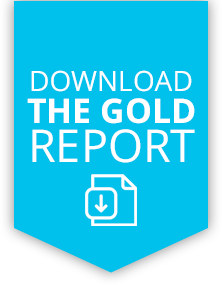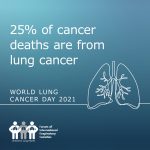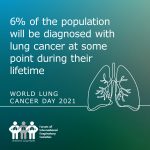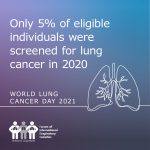On World No Tobacco Day (May 31, 2022) the Forum of International Respiratory Societies (FIRS), of which GOLD is a founding member, is voicing concerns over the tobacco industry’s impact on environmental health and ultimately lung health.
The impact of tobacco production has been emphasized by the World Health Organization (WHO) as part of this year’s World No Tobacco Day theme: #Tobacco Exposed. The WHO notes that 600,000,000 trees are chopped down to make cigarettes, 84,000,000 tonnes of CO2 emissions are released into the air, which raises global temperatures, and 22,000,000,000 litres of water are used each year to make cigarettes. These are significant examples of the burden tobacco production places on environmental resources.
Manufacturing processes of tobacco are only one part of the issue, with distribution, consumption and post-consumption waste increasing the threat to the environment.
According to Prof. Jonathan Grigg, Chair of the European Respiratory Society’s Tobacco Control Committee:
“Tobacco kills more than 8 million people per year. It harms the environment in countless ways, but we see time and time again the tobacco industry trying to mislead or distort the significant threat their industry presents to our environment. It is very important that they are held accountable and that the realities of their business are not disguised by tactics developed to show them in a better light.”
This strategy of repositioning is not new in the tobacco industry. In January 2022, FIRS issued a statement in response to the authorised takeover of the Vectura Group, a pharmaceutical company producing inhaled medicines, by Phillip Morris International, a tobacco company.
“The takeover of Vectura by Phillip Morris was a huge disappointment and another example of blurring lines and repositioning. Here we see a company which produces tobacco – synonymous with negative effects on health, diversifying into healthcare. The potential implications are of great concern.” stated Grigg.
Alongside a call for the tobacco industry to be held accountable for its role in harming the environment, FIRS urges everyone to stay well informed about tobacco industry practices. FIRS supports the message that we should all strive to be greener and to stop smoking – and help others to stop smoking – to improve our health and the health of our planet.
The Forum of International Respiratory Societies (FIRS) is an organisation comprised of the world’s leading international respiratory societies working together to improve lung health globally. The goal of FIRS is to unify and enhance efforts to improve lung health through the combined work of its more than 70,000 members globally.
FIRS comprises the American College of Chest Physicians (CHEST), American Thoracic Society (ATS), the Asian Pacific Society of Respirology (APSR), Asociación Latino Americana De Tórax (ALAT), European Respiratory Society (ERS), International Union Against Tuberculosis and Lung Diseases (The Union), Pan African Thoracic Society (PATS), the Global Initiative for Asthma (GINA), and the Global Initiative for Chronic Obstructive Lung Disease (GOLD).









